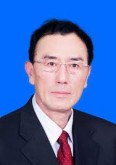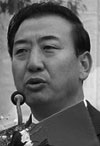Tibetans in the Chinese Communist Party Leadership
Bhuchung K. Tsering
September 28, 2012
(I have made a correction here based on a reader feedback. Apparently Dorji from Gyatsa is not the same one as Dorji Cezhug and so I have deleted this photo and the name.)

The Chinese Communist Party has finally announced that its 18th Party
Congress will be held from November 8, 2012. I would, therefore, like to
look at its significance from a Tibetan point of view, but from a different
angle.
Of course, the new leadership of China that will come out of the 18th Party
Congress will determine the future direction of the country, which will have
an impact on the Tibetans. However, I would like to look at another aspect
of the issue; the nature of Tibetan presence in the highest echelons of the
Chinese Communist Party.

The top three Party institutions (I am leaving aside the Politburo standing
committee and the Politburo, for they are but dreams for people like
Tibetans in the current scheme of things) for which Party members can
aspire for are membership of the Central Committee, alternate member of the
Central Committee, and member of the Central Commission for Discipline
Inspection. The Central Committee is supposed to be the highest decision
making body in the Party.
Signifying the importance of these institutions, their membership are
announced at every Party Congress.
The Party Central Committee would certainly have a role in formulating
China’s policy on Tibetans. The series of Tibet Work Forums that Beijing has
held on Tibet have all been at the behest of the Communist Party.
It was interesting to see that way back on March 16, 1953, there was an
“Inner-party directive drafted for the Central Committee of the Chinese
Communist Party” on “Han Chauvinism” that said the following:
“Judging from the mass of information on hand, the Central Committee holds
that wherever there are minority nationalities the general rule is that
there are problems calling for solution, and in some cases very serious
ones. On the surface all is quiet, but actually there are some very serious
problems. What has come to light in various places in the last two or three
years shows that Han chauvinism exists almost everywhere. It will be very
dangerous if we fail now to give timely education and resolutely overcome
Han chauvinism in the Party and among the people. The problem in the
relations between nationalities which reveals itself in the Party and among
the people in many places is the existence of Han chauvinism to a serious
degree and not just a matter of its vestiges. In other words, bourgeois
ideas dominate the minds of those comrades and people who have had no
Marxist education and have not grasped the nationality policy of the Central
Committee. Therefore, education must be assiduously carried out so that this
problem can be solved step by step. Moreover, the newspapers should publish
more articles based on specific facts to criticize Han chauvinism openly and
educate the Party members and the people.”
It looks like that observation has not been followed up with implementation
of a solution for even today, one of the factors that have exacerbated the
situation in Tibet is the rise of Chinese nationalism. I hope the 18th Party
Congress and the subsequent Chinese leadership will look at this issue
seriously.

Now I am not sure the extend to which the Tibetan members of the Central
Committee are able to put forth their candid views during the deliberations.
In any case, out of the current 204 members in the current 17th Central
Committee, two are Tibetans (Lekchog and Jampa Phuntsok); while out of the
167 alternate members, two are Tibetans (Tenkho and Dorjee); and out of the
127 members of the Central Commission for Discipline Inspection, two are
Tibetans (Rinchen Gyal and Guru Tsego).
In the previous 16th Central Committee there were three members as well as
three alternate members.
Who will be the new Tibetan faces in the Central Committee and how many will
there be? It appears that there may be more than 30 Tibetan delegates to the
upcoming Party Congress that will elect the new Central Committee. To give
you an idea of the nature of Tibetan presence so far, following are names of
Tibetans in the Party Central Committee in the past several years that I
have been able to compile.
- Dorji
17th Central Committee of the Communist Party of China (CPC) October 2007
1. Lekchog (Legqog) from Gyantse
2. Jampa Phuntsok (Qiangba Puncog) from Chamdo
Alternate members of the 17th CPC Central Committee
1. Tenkho (Danko) from Tsolho
2. Dorji from Gyatsa.
Members of the Central Commission for Discipline Inspection of the Communist
Party of China (CPC) elected at the 17th CPC National Congress
1. Rinchen Gyal (Rinqengyai) from Amdo
2. Guru Tsego (Ou Zegao) from Ngapa
16th Central Committee of the Communist Party of China (CPC) November 8-14,
2002
1. Lekchog (Legqog) from Gyantse
2. Dorjee Tsering (Doje Cering) from Labrang
3. Ragdi (Raidi) from Nagchu
Alternate members of the 16th CPC Central Committee, 2002
1. Jampa Phuntsok (Qiangba Puncog) from Chamdo
2. Rinchen Gyal (Rinqengyai) from Amdo
3. Guru Tsego (Ou Zegao) from Ngapa
Members of the Central Commission for Discipline Inspection of the Communist
Party of China (CPC) elected at the 16th CPC National Congress, 2002
1. Bhuchung (Bu Qiong) from Chongye
2. Pema (Baima) from Kyegudo
15th Central Committee of the Communist Party of China (CPC) September
12-18, 1997
1. Ragdi (Raidi) from Nagchu
2. Dorjee Tsering (Doje Cering) from Labrang
Alternate members of the 15th CPC Central Committee, 1997
1. Lekchog (Legqog) from Gyantse
2. Tenzin (Danzim) from Nagchu
3. Guru Tsego (Ou Zegao) from Ngapa
14th Central Committee of the Communist Party of China (CPC) October 12-18,
1992
1. Ragdi (Raidi) from Nagchu
2. Dorjee Tsering (Doje Cering) from Labrang
Members of the Central Commission for Discipline Inspection of the Communist
Party of China (CPC) elected at the 14th CPC National Congress, 1992
1. Passang (Ba Sang) from Lhoka
Alternate members of the 14th CPC Central Committee, 1992
1. Tenzin (Danzim) from Nagchu
2. Gyaltsen Norbu (Gyalcan Norbu) from Bathang
13th Central Committee of the Communist Party of China (CPC) October 25 to
November 1, 1987
1. Ragdi (Raidi) from Nagchu
2. Dorjee Tsering (Doje Cering) from Labrang
Members of the Central Commission for Discipline Inspection of the Communist
Party of China (CPC) elected at the 13th CPC National Congress, 1987
1. Passang (Ba Sang) from Lhoka
12th Central Committee of the Communist Party of China (CPC) September 1-11,
1982
1. Ragdi (Raidi) from Nagchu
2. Passang (Ba Sang) from Lhoka
Members of the Central Commission for Discipline Inspection of the Communist
Party of China (CPC) elected at the 12th CPC National Congress, 1982
1. Dorjee Tsering (Doje Cering) from Labrang
11th Central Committee of the Communist Party of China (CPC) August 12-18,
1977
1. Passang (Ba Sang) from Lhoka
2. Sangye Yeshi (Tian Bao) from Kham
Alternate members of the 11th CPC Central Committee, 1977
1. Ragdi (Raidi) from Nagchu
10th Central Committee of the Communist Party of China (CPC) August-24-28,
1973
1. Passang (Ba Sang) from Lhoka
2. Sangye Yeshi (Tian Bao) from Kham
9th Central Committee of the Communist Party of China (CPC) April 1-24, 1969
Sangye Yeshi (Tian Bao) from Kham
Glancing again at your historical list of senior Tibetans in the Chinese Communist Party compiled quite some time ago, I noticed an unfortunate mix-up. At the 17th Party Congress, a Tibetan from the Tibet Autonomous Region named Dorji became an Alternate member of the Central Committee. You have identified this Dorji incorrectly with a photo and the name “Doje Cezhug,” Doje Cezhug (perhaps more pronounceable as Dorji Tsedup) is from Ngari where he built his career in the security services and eventually was promoted to Lhasa as its Mayor. A month or so ago, he was replaced as Mayor by a Tibetan with the sinicized name Zhang Yanqing. Zhang came to the TAR 18 years ago from Pari County in Gansu Province as a Public Security Bureau official. While he is now Mayor of Lhasa, he also heads the city’s Political & Legal Committee. In the meantime Dorji Tsedup moved ‘up’ or ‘sideways’ as one of the three new Vice Chairmen (listed 13th out of 14) in the new TAR Government. Dorji Tsedup has never come even close to a Central Committee appointment.
So who is the mysterious Central Committee Alternate member named Dorji? He indeed is a Lhoka Tibetan from Gyatsa who joined the Communist Party rather late in his life, in his mid 40s, but made a name for himself in Lhasa and Beijing as an academic and professional engineer. He even spent a year in Italy lecturing and researching at the University of Pisa. Dorji is a thermal-energy and mining engineer honored by the Chinese Academy of Sciences with its highest accolade. As Party Secretary and head of the TAR’s Geological & Mineral Exploration & Development Bureau as well as its National Lands & Resources Bureau, Dorji has been associated with resource extraction activities in the TAR. Chen Kuiyuan, Guo Jinlong and Zhang Qingli all found favor with him, and I suspect that Zhang thought he might be an appropriate national symbol for the new Tibet. Zhang also must have had greater political expectations for Dorji otherwise the appointment of a distinguished but mere bureau chief to the Central Committee would be impossible. For whatever reasons (possibly the 2008 civil disturbances in Lhasa and elsewhere), nothing of the sort ever happened and his Central Committee Alternate appointment just embarrassingly fizzled out. Even though the present TAR Party Standing Committee desperately needs at least two new Tibetan members, Dorji at 61 is probably too old to make it. He recently was promoted to be a Vice Director of the new Tibet People’s Congress (listed 7th out of 13) and most likely will retire there.
I hope this clears up the Dorji question.
Duo Hua
Thank you for your correction and insight. I will make the changes accordingly.